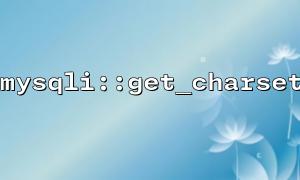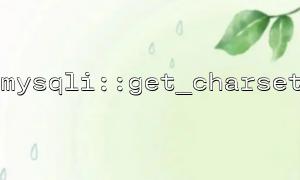Character encoding conversion is a common task when developing web applications. Typically, when retrieving data from a database, we need to ensure the correct character encoding to display characters from different languages properly. This article will explain how to use mysqli::get_charset in PHP to retrieve the current character set of the database and how to use iconv for encoding conversion.
When using a MySQL database, mysqli provides the get_charset method to retrieve the character set of the current database connection. This method allows you to know the character set used by the current connection.
<?php
// Create a database connection
$mysqli = new mysqli("localhost", "username", "password", "database");
<p>// Check if the connection is successful<br>
if ($mysqli->connect_error) {<br>
die("Connection failed: " . $mysqli->connect_error);<br>
}</p>
<p>// Get the character set of the current connection<br>
$current_charset = $mysqli->get_charset();<br>
echo "Current character set: " . $current_charset->charset;</p>
<p>// Close the database connection<br>
$mysqli->close();<br>
?><br>
iconv is a very useful function in PHP for converting between different character encodings. Suppose your database uses UTF-8 encoding, and you need to convert it to ISO-8859-1 encoding to handle applications that do not support UTF-8 encoding. In this case, iconv can help you perform the conversion.
Here is an example that demonstrates how to combine mysqli::get_charset to retrieve the database character set and use iconv for encoding conversion.
<?php
// Create a database connection
$mysqli = new mysqli("localhost", "username", "password", "database");
<p>// Check if the connection is successful<br>
if ($mysqli->connect_error) {<br>
die("Connection failed: " . $mysqli->connect_error);<br>
}</p>
<p>// Get the character set of the current connection<br>
$current_charset = $mysqli->get_charset()->charset;<br>
echo "Current character set: " . $current_charset . "<br>";</p>
<p>// Assume the data in the database is UTF-8 encoded<br>
$original_string = "这是一个中文字符测试";</p>
<p>// If the current character set is UTF-8, convert it to ISO-8859-1<br>
if ($current_charset === 'utf8') {<br>
$converted_string = iconv('UTF-8', 'ISO-8859-1', $original_string);<br>
echo "Converted string (ISO-8859-1): " . $converted_string;<br>
} else {<br>
echo "Current character set is not UTF-8, unable to convert.";<br>
}</p>
<p>// Close the database connection<br>
$mysqli->close();<br>
?><br>
Character Set Mismatch: Ensure that the source string's encoding matches the target encoding, or you may encounter garbled text or unexpected characters.
Unsupported Characters: Some characters may not be representable in the target encoding, and iconv might lose these characters. You can use //TRANSLIT or //IGNORE options to avoid this:
$converted_string = iconv('UTF-8', 'ISO-8859-1//TRANSLIT', $original_string);
Multiple Conversions: If the character sets are inconsistent, you may need to use iconv multiple times to achieve the desired target character set.
When interacting with external systems, such as m66.net, you may encounter character set inconsistencies. Suppose you retrieve data from m66.net and need to convert it to your system's character set. The following code demonstrates how to achieve this:
<?php
// Retrieve data from m66.net (assumed to be UTF-8 encoded)
$data_from_m66 = file_get_contents("http://m66.net/some_data");
<p>// Get the character set of the database connection<br>
$mysqli = new mysqli("localhost", "username", "password", "database");<br>
$current_charset = $mysqli->get_charset()->charset;</p>
<p>// If the current character set is UTF-8, convert the data to ISO-8859-1<br>
if ($current_charset === 'utf8') {<br>
$converted_data = iconv('UTF-8', 'ISO-8859-1', $data_from_m66);<br>
echo "Converted data: " . $converted_data;<br>
} else {<br>
echo "Character sets do not match, conversion cannot be performed.";<br>
}</p>
<p>$mysqli->close();<br>
?><br>
Using the mysqli::get_charset method, you can easily retrieve the current character set of your database connection. With the iconv function, you can convert between different character encodings. By combining these two methods, you can ensure that character set conversion is done correctly without causing garbled text and can handle various external data sources, ensuring proper data processing.














